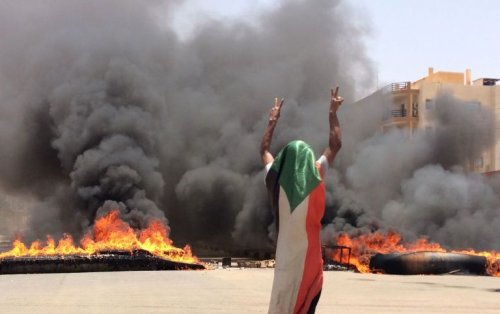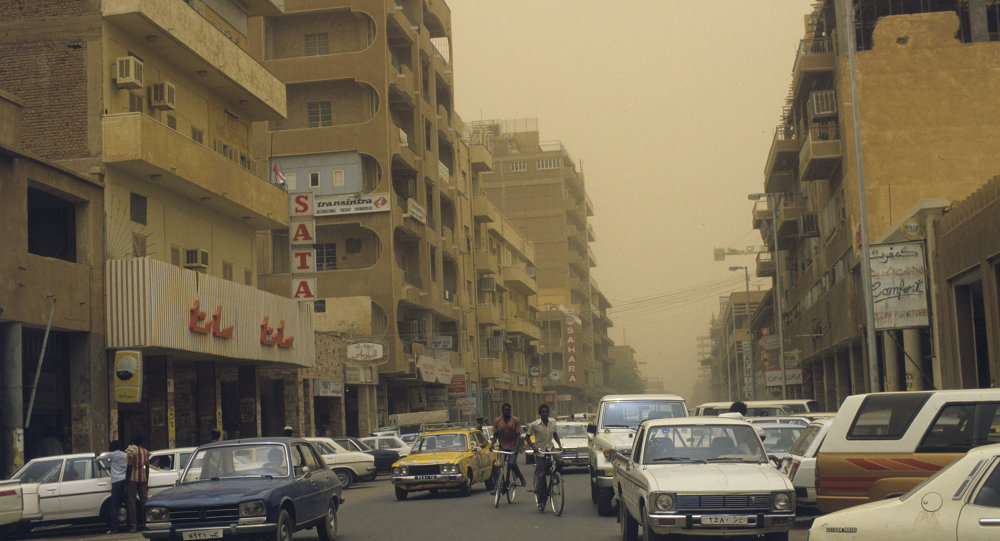www.aljazeerah.info
News, June 2019
Archives
Mission & Name
Conflict Terminology
Editorials
Gaza Holocaust
Gulf War
Isdood
Islam
News
News Photos
Opinion Editorials
US Foreign Policy (Dr. El-Najjar's Articles)
www.aljazeerah.info
|
Editorial Note: The following news reports are summaries from original sources. They may also include corrections of Arabic names and political terminology. Comments are in parentheses. |
Ethiopian Mediation Results in 15-Member Sudanese Sovereignty Council to Lead the Transitional Period, Civil Disobedience Continues
June 11, 2019
 |
 |
| A Sudanese protester near khartoum s army headquarters, June 11, 2019 | A street in Khartoum, Sudan. |
Opposition FFC to lead Sudan’s Sovereign Council
Sudan Tribune, June 11, 2019 (KHARTOUM) -
The opposition Forces for Freedom and Change (FFC) are expected to announce the name of its candidates for the Sovereignty Council, the Prime Minister and judicial bodies in the transitional ruling authority, in line with a proposal made by the IGAD chair Abiy Ahmed.
Opposition sources close to the ongoing discussions talks between the two sides confirmed to Sudan Tribune that the FFC will hand over to the Transitional Military Council (TMC) the names of eight members of the collegial presidency as the latter will designate seven before to announce the formation of the 15-member Sovereign Council.
However, the sources said the public announcement may be delayed following leaked reports revealing the deal struck after a mediation brokered by the Ethiopian Prime Minister Abiy Ahmed who is also the IGAD Chair.
The composition and the chairmanship of the Sovereign Council were the sources of contention between the TMC and FFC. Since last May, they have agreed that the transitional government will be appointed by the FFC from independent qualified Sudanese persons to carry out political and economic reforms before to hold elections within three years.
Last Friday, Abiy was in Khartoum upon the recommendation of the African’s Union Peace and Security Council (PSC) to mediate between the Sudanese stakeholders.
Also, the PSC suspended Sudan’s membership and threatened to sanction the TMC members in the event they (do not) hand over power to a civilian-led government. In the same tread, the region and the international community increased pressures on the junta.
According to the sources, the opposition has picked Abdalla Hamdok former Executive Secretary, a.i. of the United Nations Economic Commission for Africa(UNECA) for the position of the prime minister.
The coalition will further announce candidates for the post of Attorney General, the President of the judiciary.
The opposition has launched a successful general strike that was followed by the Sudanese who showed their support to the FFC.
Four killed during the first day of Sudan’s general strike
Sudan Tribune, June 9, 2019 (KHARTOUM) -
Four people were shot dead in the capital on Sunday during the first day of the general strike which was largely followed in Khartoum and other Sudanese cities.
Sudanese deserted the streets and of Khartoum, as shops and markets were closed. Also, most of the public facilities in Khartoum were disrupted and air traffic at Khartoum airport stopped.
Official media continued to claim that public corporation and institutions continue to work normally activity assertions, but activists released images of empty streets without traffic and shops completely shut down. Also, banks were closed because their staff refused to work.
Reliable sources confirmed the disruption of the work of the courts and public prosecution offices after the strike of the judiciary staff.
In the same way, daily newspapers and magazines were not published due to the large participation of journalists and newspaper workers in the civilian disobedience.
The opposition Sudanese Professionals Association (SPA) the spearhead of the pro-democracy protests in Sudan said the general strike will end with the fall of the military junta and the establishment of transitional civilian rule.
Sunday was the first working day after the end of the Eid al-Fitr holiday.
The SPA had called for the general strike after the killing of over a hundred peaceful protesters by the Rapid Support Forces (RSF) militiamen in the first hours of Monday 3 June.
Talks between the ruling military council and the opposition over power transfer stalled after the junta’s refusal to accept give the opposition coalition Forces for Freedom and Change to control of the collegial presidency saying they want to oversee the transition process.
The Central Committee of Sudan Doctors (CCSD), a pro-democracy group, said four people were killed Sunday, some of them by gunshot wounds to the neck and chest in different parts of the capital.
The four victims were at the roadblocks and barricades in the neighbourhoods of the capital.
The CCSD said the killing of the four protesters bringing the death toll of civilians killed after 3 June attack on the sit-in to 118 people.
The RSF militiamen attempted to remove the roadblocks and barricades from the streets but they were shortly reestablished by the protesters.
In addition, the security forces fired tear gas at a group of protesters in Khartoum.
The cities of Wad Madani of Aljazira state, Port Sudan on the Red Sea, and Karima in Northern state, as well as other towns, took part in the nationwide protests.
Also, the SPLM-N Agar released pictures showing its Chairman Malik Agar participating with thousands of civilians in a sit-in in the rebel-held area of the Blue Nile state.
***
Civil disobedience campaign empties streets of Sudan's capital
June 10, 2019, almasdaronline-reuters ١٠ íæäíæ ٢٠١٩
A campaign of civil disobedience to demand civilian rule left the streets of Sudan’s capital Khartoum largely deserted as the working week began on Sunday, while a 20-year-old man was shot dead in Omdurman, witnesses and opposition medics said.
Opposition and protest groups had called for workers to stay at home after security forces stormed a protest camp on Monday, killing dozens and dealing a blow to hopes of a peaceful transition after the overthrow of president Omar Hassan al-Bashir in April.
Transitional Military Council (TMC) spokesman Shams El Din Kabbashi said the council was willing to listen to the opposition’s demands and restart negotiations, which it halted after the attack on the camp.
After the raid, TMC head Abdel Fattah al-Burhan scrapped all agreements with the Declaration of Freedom and Change Forces (DFCF), an opposition alliance, and called for elections within nine months. The opposition rejected the plans.
The raid came after weeks of wrangling between the TMC, which took over from Bashir, and the DFCF over who should steer a transition leading to elections.
Protesters did take to the streets in several neighborhoods of Khartoum on Sunday amid heavy security. Security forces fired shots into the air and used tear gas to disperse protesters in Khartoum North, witnesses said.
Elsewhere in the capital, few pedestrians or vehicles could be seen. Public transport was barely functioning and most commercial banks, private companies and markets were shut, though some state banks and public utility offices were open.
“CIVILIAN GOVERNMENT NEEDED”
“We will not go back to work until the (opposition Sudanese Professionals’) Association announces the end of the strike,” said Ahmad al-Noor, a 46-year-old employee at a private food company. “Sudan must be governed by a civilian government.”
The SPA, which spearheaded the anti-Bashir protests, is part of the DFCF.
At Khartoum airport, where few flights were operating, travelers crowded the departure hall. Most travel agencies were closed because of an internet outage, and ticket prices soared.
However, the state news agency SUNA said the airport was “operating normally” and reported “complete attendance of employees in different airport units”.
Kabbashi told Sky News Arabia that “life has not been affected much by the disobedience declared today”.
But later on Sunday, the head of the TMC security committee told SUNA that the DFCF was responsible for “unfortunate events” that he said had been caused by “the irrational practices of the so-called neighborhood resistance committees, which use children and force them to close roads and erect barricades in flagrant violation of the law”.
He said “organized groups paid by certain parties” had attacked police buildings and checkpoints, seeking to “obtain weapons and transfer their battles against the armed forces and the Rapid Support Forces into the capital and the big cities”.
He said the TMC would reinforce security to “restore normal life”, facilitate movement and guard strategic facilities.
PROTESTER SHOT
In Omdurman, across the Nile from Khartoum, 20-year-old Ayman Osama died after being shot in the chest at a road barricade, the Central Committee of Sudanese Doctors said on social media, accusing a paramilitary force of killing him. The Rapid Support Forces (RSF) had no immediate comment.
Witnesses say the RSF led last Monday’s raid. Its troops have been heavily deployed in Khartoum, some with machine guns mounted on their pickup trucks.
The RSF grew out of the Arab Janjaweed militias accused of committing atrocities in Darfur during a civil war that began in 2003. Bashir’s government denied allegations that the militias had burned villages and raped and executed civilians.
State television reported that a senior commander of the RSF, whose leader General Mohamed Hamdan Dagalo is deputy head of the TMC, had been replaced.
Opposition medics put the death toll at 118 in the storming of the camp outside Khartoum’s Defence Ministry and subsequent security crackdown. The government has put the death toll at 61, including three members of the security services.
Also on Sunday, banking expert Mohamed Ahmed Bushra said he had turned down an offer from the TMC to become deputy governor of the central bank.He told Reuters that current conditions and the failure to form a transitional civilian government made it difficult for the central bank to implement measures to address Sudan’s economic crisis.
***
Share the link of this article with your facebook friendsFair Use Notice
This site contains copyrighted material the
use of which has not always been specifically authorized by the copyright
owner. We are making such material available in our efforts to advance
understanding of environmental, political, human rights, economic,
democracy, scientific, and social justice issues, etc. We believe this
constitutes a 'fair use' of any such copyrighted material as provided for
in section 107 of the US Copyright Law. In accordance with Title 17 U.S.C.
Section 107, the material on this site is
distributed without profit to those
who have expressed a prior interest in receiving the included information
for research and educational purposes. For more information go to: http://www.law.cornell.edu/uscode/17/107.shtml.
If you wish to use copyrighted material from this site for purposes of
your own that go beyond 'fair use', you must obtain permission from the
copyright owner.
|
|
|
|
||
|
||||||


